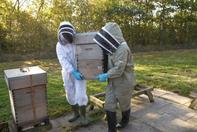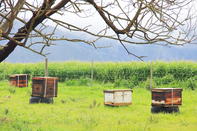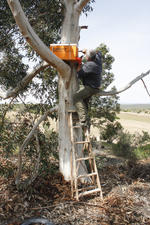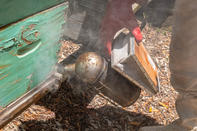How to Learn about Beekeeping in South Africa
Many new beekeepers watch YouTube videos, but most of these videos are taken in the USA and Europe and are not suited to beekeeping for beginners in South Africa. South African bees behave slightly different; they are more aggressive in our country and they sting with serious consequences if you are allergic to bees says Shirley Downie of Beeware.

Therefore it is suggested that you attend a beekeeping course and/or do a lot of research with established beekeepers. Learn about beekeeping by reading or attending a beekeeping course. Working with a good mentor will also teach you about the practical ways of beekeeping. In South Africa, ‘The Blue Book’ (“Beekeeping in South Africa” by Johannesmeier et.al.) is considered the best book on beekeeping.
Topics on a beekeeping course include theory on bees, their habitat, hive management, queen rearing and honey harvesting. The course will also explain how to choose and to set up a hive; identify the beekeeping equipment needed; how to collect and process honey as well as how to move and catch swarms. If you can’t attend a beekeeping course or an information day, try to find a mentor such as an experienced beekeeper willing to share their knowledge about urban beekeeping in South Africa.
Where to Put Beehives?

If you live in a town, find out from the municipality if it is allowed to keep bees in the suburb. If so, keep hives at least 50 m away from animals and people. In rural areas, keep hives away from chickens and horses, bees do not like the smell of these animals. The site where bees are kept is referred to as an apiary. An apiary needs to be accessible, sheltered, dry and sunny, but not prone to frost. In addition, it needs to be able to provide food and water for honeybees no further than 3 - 5 km from the hive. Although some areas may have enough food for a few colonies (swarms), it might not be able to support it throughout a whole season.
Therefore, it may be necessary to move colonies to suitable crops when they are in flower. This can serve as a valuable (paid-for) pollination service to farmers with an additional bonus of honey for the beekeeper. Always ask permission of a property owner before placing your hives on his/her land. The South African Bee Industry Organisation (SABIO) represents beekeepers in South Africa and advises all beekeepers to register their hives with the Department of Agriculture, Forestry and Fisheries (DAFF).
Where to Get a Beehive and Colony

To start beekeeping you will need a colony of bees and a hive to keep them. There are several ways to acquire a bee colony or go about bee hive sales in South Africa: You can buy a swarm from an established beekeeper. You can trap a new swarm (a wild or trek swarm). Trapping is best in springtime.
You can relocate an existing swarm into a hive. However, this requires some skill. You can attract a bee colony by rubbing honey on the base of the hive, using a commercial swarm lure or by rubbing lemongrass on the base of the hive.
Bees can live in any cavity such as a cave, holes in trees or wooden boxes. To house a bee colony you will need a hive. This can be bought from a bee equipment company. There are several reputable beehive sellers but one still needs to be very cautious of the seller as some hives have not been up to standard.
The cheapest is not necessarily the best. Sometimes, bee farmers sell used hives, but this must be sterilised before use to prevent the transfer of diseases to your swarm. Used hives can be used to trap a new swarm of bees.
Beekeeping Tools

Like any hobby or profession, you need the right tools to work with bee colonies. If the hives are not maintained properly, the colony will leave the hive and look for a safer place to settle.
It is recommended that you purchase a zip-up overall and a veil to protect your face and neck from being stung. Also needed are good leather or PVC gloves, gaiters to protect your ankles and boots. As part of a new beekeeper’s kit, you will need a smoker, a hive tool and a bee brush. Later, when harvesting honey, extracting equipment will also be needed.
By Marinda Louw